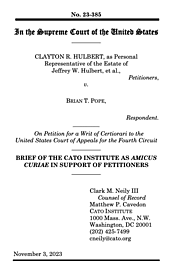Learn more about Cato’s Amicus Briefs Program.
The Petitioners in this case were peacefully protesting in favor of Second Amendment rights on a sidewalk outside the Maryland State Capitol. An aide at the Governor’s Mansion called Capitol Police and requested that they “sort out the situation.” An officer approached the Petitioners and told them to leave the sidewalk. The Petitioners declined. The officer arrested one of the Petitioners, who had been holding a sign, then the other, who had started video-recording the arrest. The criminal citations against the Petitioners were quickly dismissed.
The district court denied the officer’s motion for summary judgment. It found “no evidence that the picketers were impeding pedestrian or vehicular traffic” and a dispute as to whether they “were in the street or using the crosswalk.” However, the Fourth Circuit reversed, holding that the officer was entitled to qualified immunity.
Cato filed an amicus brief asking the Supreme Court to reverse that decision and abolish qualified immunity. Neither Section 1983’s text nor the early history of constitutional torts justifies qualified immunity. In fact, courts have wrongly overlooked the fact that Section 1983—as originally enacted by Congress—forecloses qualified immunity. What is more, qualified immunity undermines public confidence in officials, including law enforcement and the courts, and is based on faulty assumptions about how official liability actually works. The mere fact that Congress has not done away with qualified immunity is no reason for the Court to maintain it as a bar to relief for Americans whose rights are violated. The Supreme Court should do away it.

This work is licensed under a Creative Commons Attribution-NonCommercial-ShareAlike 4.0 International License.

